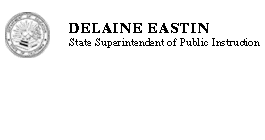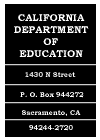SFPD Memo 00-10 School Sites Within Coastal Zone


Official Letter
Official Letter
July 5, 2000
SFPD MEMO 00-10
To: County and District Superintendents
Subject: Proposed School Sites Within the Coastal Zone
The California Department of Education (CDE) frequently receives questions from the public concerning proposed school sites in the California coastal zone. This information identifies how those districts located in the coastal zone may be affected by the California Coastal Act and resultant policies adopted by the California Coastal Commission and local governments, particularly as they apply to school site selection, acquisition and new construction.
The California Coastal Act (California Public Resources Code sections 30000 et seq.) was enacted by the State Legislature in 1976 to provide long-term protection of California's coastal regions. The coastal zone encompasses approximately 1.5 million acres of land extending from the sea to an inland boundary that varies from a few blocks in the more urban areas of the State to about five miles in less developed regions. Coastal zone boundary maps are available from the Coastal Commission.
Coastal Act policies constitute the standards used by the Coastal Commission in its coastal development permit decisions and for the Commission's review of local coastal programs (LCPs) prepared by local governments and submitted to the Commission for approval. Coastal cities and counties must incorporate the Coastal Act policies into their individual LCPs. All development (as defined by the Coastal Act) that occurs in the coastal zone, including schools, requires a coastal development permit. The authority to issue coastal development permits is delegated to local governments upon the Commission's certification of a LCP. Permits issued by local governments for public works projects such as schools are then appealable to the Coastal Commission. If no LCP is certified for a particular jurisdiction, the State Coastal Commission retains the direct permitting authority for coastal development.
While each LCP reflects unique characteristics of individual local coastal communities, regional and statewide interests and concerns must also be addressed in conformity with Coastal Act goals and policies as they pertain to school siting and construction.
These policies support the expansion of public recreation, and shoreline access opportunities in the coastal zone, as well as reservation of sites for coastal dependent
Land uses such as commercial fishing. The Coastal Act does not specifically address the siting of schools in the coastal zone, although policies of the law generally encourage the provision of adequate public services for new urban development.
School districts that fall within the coastal zones are advised to check with their local city and/or county planning departments to ensure that future school sites envisioned by the district are consistent with the LCP that has been approved by the Coastal Commission. Districts not within an area with a certified LCP are advised to work directly with their local Coastal Commission office as early as possible in the process to ensure their planned projects meet Coastal Act standards. Whether a district falls within the jurisdiction of a local government with a certified LCP or within the state Coastal Commission's jurisdiction, there should be continued coordination among the district, the local government, and Coastal Commission throughout the school siting and design processes in order to resolve any conflicts and to develop alternatives consistent with applicable coastal policies.
Further information may be obtained by contacting the Commission
at any of the offices listed on the map provided as an attachment
to this memo. You can also visit the Commission's Web site
![]() .
.
Duwayne Brooks, Director
School Facilities Planning Division
Assistant Superintendent of Public Instruction
DB:jdd
Enclosure (1)
Listing of the California Coastal Commission Addresses and Telephone Numbers
cc: Coastal Commission
